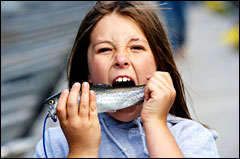Dear Umbra,
I’ve been a vegetarian for almost 10 years. I started when I was 15, on pretty much a whim just to see if I could do it, but since then I’ve come to appreciate what I’m doing for my body and the planet. Lately, though, whether from boredom or subconscious protein cravings, I’ve been thinking about reintroducing fish to my diet.
For convenience, variety, and health, I think it could be a good thing. But I don’t want to go backwards in terms of what good (or least possible harm) I’m doing the environment via my eating habits. (I’m also worried, knowing myself, that fish will be a slippery slope to hamburgers and bacon. But maybe that’s my own problem. Maybe? Probably.) I’ve done the research about what fish is best to eat, for my body and the planet, but even armed with that info, especially keeping in mind my probably only most-of-the-time ability to follow it, am I still best off avoiding eating animals entirely?
Jaime
New York, N.Y.
Dearest Jaime,
You’ve got me thinking about the relative difficulties of a complete ban vs. restricted access. As you say: should you continue your complete ban on animal flesh, or will you be able to reintroduce select flesh without falling down the slippery slope of just-this-once. Bacon is a dangerous, dangerous food, requiring strong will. In fact, I probably shouldn’t be answering your question, because my credentials as a strong-willed bacon avoider lapsed years ago, and consequently I take the “everything in moderation” stance. I also, you may have noticed, take the “support a local living economy” stance, and I have to tell you, bacon procured under that regime is the best bacon money can buy.

Fish: the gateway flesh?
Photo: iStockphoto
Aren’t I helpful?
Basically, the fewer meat products you eat, the better for the environment. Generally. There’s lots of hair-splitting out there in meat vs. veggie academia about things like how meat is produced; where veggies are grown and how; whether local, small-scale meat may have the upper hand on no meat at all, etc. — but the big analyses show that less meat is the way to go. If I may poke at health, too, excessive animal-product consumption is a poor idea for one’s body. From what I understand, though, consuming moderate amounts of animal products can be positive for your health.
The moral factors of meat consumption are another issue, and lead us into a little philosophical side street about why we are environmentalists. Does our morality guide us, or a sense of social responsibility, a leave-no-trace ideal, a love for all living beings, or have we made an economic analysis that environmental stewardship is correct action? If you really don’t want to fall down the slippery slope, it may help to work out a few of the questions about why you are an environmentalist and why you choose fish first, because it will bear on your meat habits. If you have decided fish is all right to eat because it was wild before it was killed, would you be OK eating venison? Perhaps fish is first because it seems like nature’s bounty rather than agriculture, or because it doesn’t have a nose. Are happy roaming steers similar or dissimilar to halibut?
I think that it’s OK to introduce meat back into your diet. You can’t expect to stay fixed in all your habits, and we allow ourselves to drive cars and buy clothes washers. You understand the limitations under which you should eat animals. Educate yourself about which fish are bountiful and healthful. Find ways to buy meat that work with your environmental priorities. If you find yourself eating outside your self-set guidelines, stop and reevaluate. If you can’t stop, try buying a live animal and killing it yourself. That may help with the stopping.
Wildly,
Umbra


